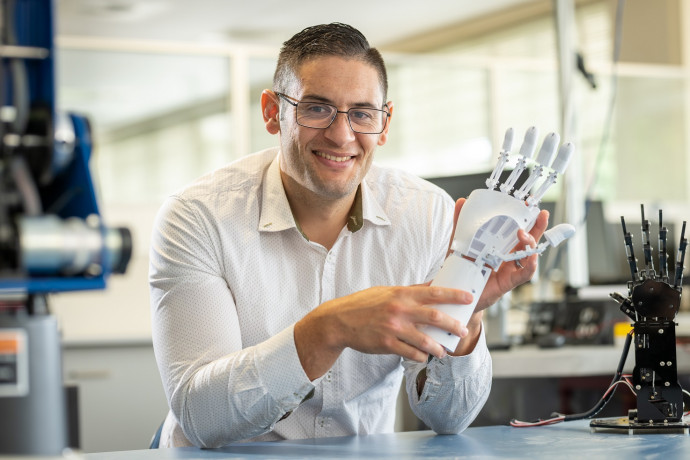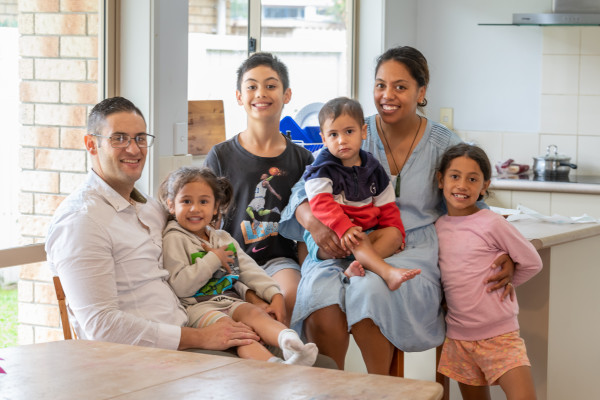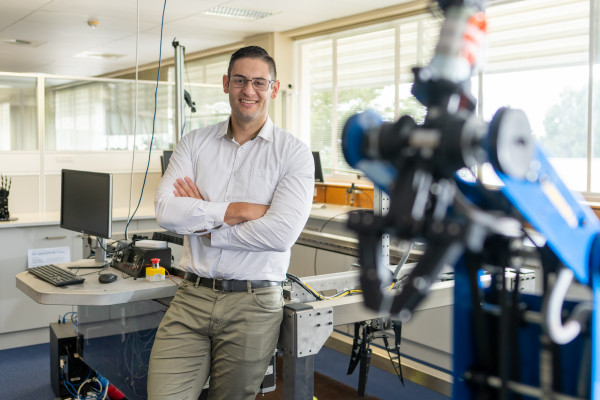Dr Mahonri Owen

A strong desire to help others drives Mahonri Owen in his research and support for rangatahi Māori. Now, thanks to Whitinga funding, he embraces a full-time career in teaching and engineering research at Te Whare Wānanga o Waikato University of Waikato.
Ko Mahonri Owen tōkū ingoa.
He uri ahau nō Ngāphuhi rāua ko Ngāti Tūwharetoa ahau.
E mahi ahau ki kai rangahau ki roto i te Te Whare Wānanga o Waikato.
Q. What is your research?
I’ve taken on the challenge of trying to make a machine controlled by a brain, a prosthetic hand. It’s a huge step into neuroscience, while being an engineer myself. I’m trying to create machines that help people with nervous system disorders or amputations, which have the potential to improve the quality of life for millions around the world.
Māori and Pasifika are overrepresented in nervous system disorders and diabetes, which leads to lower limb amputation, and I specifically look within my own iwi and te ao Māori for opportunities to help.
Q. What got you started on your research journey?
In 2008, while on placement in South Africa, I experienced situations where I had no ability to offer assistance to people who really needed it, and it was very life changing for me. From that point on, I knew that if I could try to help people, then I could be happy.
Q. What led you to apply for a Whitinga Fellowship?
I never really intended to do a masters, but I found I loved it. When the opportunity arose for me to do a doctorate, my wife and I had some big decisions to make. It was not easy for me to put the next four years into study, when I could be working and supporting our young family. I’m very thankful to her, and for the sacrifices she’s made, so I could continue with my research.
I had just completed my PhD when COVID hit. I thought a full time academic position had been on the cards, but that all changed, and I had to leave the University for two years.
After my successful Whitinga Fellowship application, I was able to negotiate a full time job back at the University. Now I'm lecturing and doing research, and I’m learning how to operate in an academic space, and navigate that as a Māori where there isn't too much representation.
Q. Has the Whitinga led to other opportunities?
There are so many things I’m grateful for. I recently attended the Nobel Prize Dialogue, a symposium in Singapore where we listened to 21 Nobel laureates exploring the best path to a world with improved wellbeing for all. I had the incredible experience of presenting as one of the ten young scientists. It was an amazing experience.
Something I’ve found just as valuable, has been the ability to travel and build relationships here. It’s offered me the freedom for whakawhanaungatanga and to meet more iwi, hapu and Māori entities because there's a whole space there, particularly in engineering, that's largely untapped.
Q. Have you received much support on your research journey?
Well, I can’t stress enough how much I owe to my wife, and my whanau. My mother always taught me the importance of education. I was always expected to go to school to get educated, whereas that's not what I was really surrounded with, where you’re encouraged to go to work and to help the family.
Having the support of mentors like Mike Duke, the Dean here, Te Taka Keegan and Tahu Kukutai in particular, has been so important. They really want to see you be successful, which is really encouraging as a young academic.

Q. What’s next?
Once the award has finished, it will move into a full-time, permanent academic position, which is a really lovely thing to be offered.
I would love my prosthetic research to go as far as it can to help people, but I'm naturally inclined to look at challenges, and there are a number of other areas I’m keen to explore.
Being an intermediary, and support for Māori in engineering is another key driver. Māori are a very beautiful and a very clever people, and I think that gets lost sometimes.
In the two years before coming back to the University, I worked in Māori capability development. They’re not thriving in this space, and it’s not because Māori can't do it, we just need to do a better job in looking after them. I’ll look out for any Māori students who want to do engineering, and it's an easy thing for me to do because I was fortunate to get support, so I think it's only right that I give the same opportunities.
Q. Do you have any advice for other early career researchers?
Advice that comes to mind straightaway, is to just apply for everything you can. It can be a bit of work, but you're never going to regret applying for something and then being successful for it.
My grandmother taught me a whakatauki which really helps me. ‘He aha te mea nui a te ao? What is the most important thing in this world? He tāngata, he tāngata, he tāngata. It is people.’ And I've noticed that wherever I go in the world, the answer is always the same. It's always people.
If, as an early career researcher, you can focus your project on ‘what it’s doing to help people?’, it will be a lot easier.

